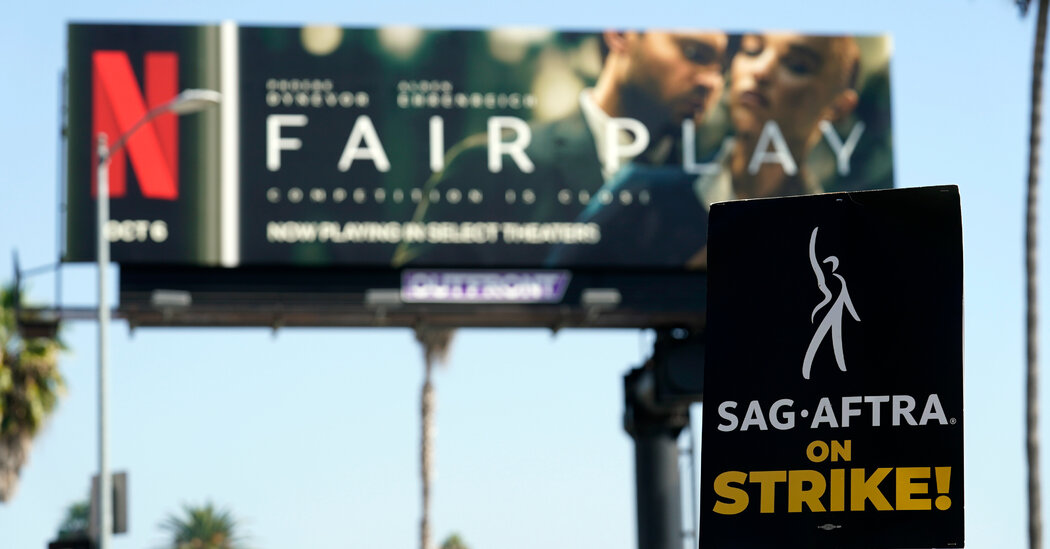Following several productive days at the negotiating table, Hollywood studios are growing optimistic that they are getting closer to a deal to end the 108-day actors’ strike, according to three people briefed on the matter.
These people, who spoke on the condition of anonymity because of the sensitivity of the labor situation, cautioned on Sunday that some issues remain unresolved with the actors, including protections around the use of artificial intelligence technology to create digital replicas of their likenesses without payment or approval. But other knots had started to become untangled, the people said.
SAG-AFTRA, as the actors’ union is known, had been asking for an 11 percent raise for minimum pay in the first year of a contract, for instance. Studios had insisted that they could offer no more than 5 percent, the same as had recently been given (and agreed to) by unions for writers and directors. Early last week, however, studios lifted their offer to 7 percent. By Friday, SAG-AFTRA had eased its demand to 9 percent.
SAG-AFTRA did not respond to requests for comment. The Alliance of Motion Picture and Television Producers, which negotiates on behalf of the major entertainment companies, declined to comment.
In an email to SAG-AFTRA members on Friday night, the union’s negotiating committee said, “We completed a full and productive day.” On Saturday, the union sent a routine reminder about pickets planned the coming week, including one scheduled for Wednesday at Walt Disney Studios. The sides continued to negotiate on Sunday.
Last week, studio executives made it known — in conversations with filmmakers, agents, reporters and actors themselves — that a deal must be done (or nearly so) by the end of this week, or else sets were likely to remain dark for another two months.
Put another way, unless talks speed up, January could be the soonest that casts (and crews) see paychecks.
Brinkmanship? Of course. It’s a standard part of any strike. The companies, however, said they were simply pointing to the calendar. It will take time to reassemble creative teams, a process complicated by the coming holidays. Preproduction (before anyone gathers on a set) for new shows can take up to 12 weeks, with movies taking roughly 16 weeks. Bake in the time for contract ratification by the SAG-AFTRA members.
More than 4,000 mostly workaday actors responded on Thursday with an open letter to their union, saying, “We have not come all this way to cave now.” They added, “We cannot and will not accept a contract that fails to address the vital and existential problems that we all need fixed.”
At the same time, some stars have pressured union leaders to approach negotiations with greater urgency. Out-of-work crew members have also grown increasingly frustrated with the Hollywood shutdown. The International Alliance of Theatrical Stage Employees, which represents 170,000 crew members in North America, has estimated that its West Coast members alone have lost more than $1.4 billion in wages.
For their part, companies are under pressure to salvage their spring television schedules and movie lineups. On Friday, Disney delayed a live-action version of “Snow White,” which had been scheduled for March 26, because it would be impossible to finish in time. Earlier in the week, Paramount pushed back Tom Cruise’s next “Mission: Impossible” movie, along with “A Quiet Place: Day One,” starring Lupita Nyong’o.
The entertainment business has been at a standstill for months because of strikes by writers, who walked out in May, and actors, who joined them in July. The writers’ strike was resolved last month, prompting hopes of a speedy resolution between studios and the actors’ union. Instead, the process has been slow.
Talks between the sides restarted on Tuesday after breaking down earlier in the month over a union proposal for a per-subscriber fee from streaming services, which Netflix’s co-chief executive Ted Sarandos publicly dismissed as a “levy” and “a bridge too far.” SAG-AFTRA accused studio executives of “bully tactics.”
It is unclear how the streaming issue might be resolved. But there is real hope in Hollywood that people may soon be back to work.
“At this time, we have no concrete information from any studio,” Michael Akins, an International Alliance of Theatrical Stage Employees official in Georgia, wrote to members on Friday. “But the writing is clearly on the wall that the industry shutdown is in its final days.”
John Koblin and Nicole Sperling contributed reporting.


